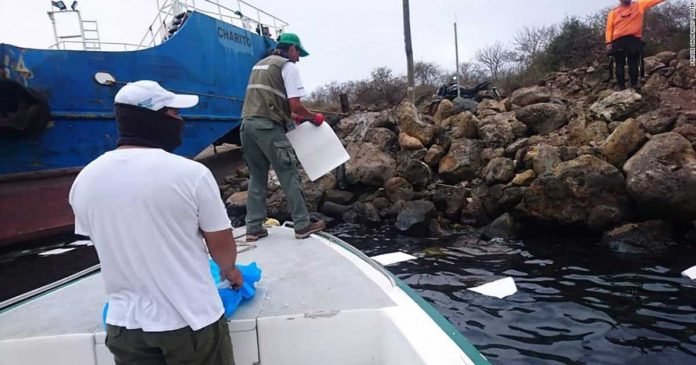Ecuador takes emergency steps to contain Galapagos oil spill
Emergency teams in the Galapagos Islands are working to contain a 600-gallon oil spill after a cargo vessel overturned while being loaded with containers early Sunday, local officials said on Twitter.
Ecuador officials announced Sunday that a fuel spill in the Galapagos Islands, caused when a barge sank carrying 600 gallons of diesel fuel, was “under control.”
Authorities had activated emergency protocols earlier Sunday to contain the environmental impact of the spill in the Galapagos archipelago, a UNESCO World Heritage Site that is home to one of the most fragile ecosystems on the planet.
“The situation is under control, and a series of actions have been deployed to mitigate the possible effects,” the presidential communications office said in a statement, adding the response operation had “controlled” the spill.
The accident, in which one person was injured, occurred in a port on San Cristobal Island, the easternmost island in the chain, when a crane collapsed while loading a container holding an electric generator onto a barge.
#SanCristóbal| El @parquegalapagos y @armada_ecuador colocan barreras de contención y paños absorbentes para reducir el riesgo ambiental por hundimiento de gabarra Orca, con 600 galones de diesel almacenados. Desde #SantaCruz se dispone el envío de material de contingencia. pic.twitter.com/nQ0aRVug8I
— Parque Galápagos (@parquegalapagos) December 22, 2019
The falling container destabilised the ship, which was carrying 600 gallons of diesel fuel, causing it to sink.
The generator and the loading crane were also submerged.
The Emergency Operations Committee (COE) took “immediate action to reduce the environmental risk” in the so-called Enchanted Islands.
Personnel from the Galapagos National Park (GNP), the official nature reserve authority, and the Ecuadorian Navy set up spill containment barriers and oil absorbent cloths around the fuel patch.
Galapagos minister Norman Wray told reporters that work was under way to recover the diesel. He also said the generator, which was intended to supply energy on Isabela Island, and the barge would be replaced “as soon as possible.”
Isabela Island, the largest island, is currently facing energy rationing. Wray assured reporters that food supply levels in the Galapagos would remain normal despite the loss of the barge.
The same barge, which is used to transport fuel and construction materials to the Galapagos, had sunk previously in February 2018 due to a weight imbalance, in a port on the Guayas River.
The Galapagos Islands, located 620 miles (1,000 kilometers) east of mainland Ecuador, helped English naturalist Charles Darwin develop the theory of evolution.
The Galapagos, a UNESCO World Heritage site, are home to some of the most unique and scientifically significant ecosystems on earth. It is part of Ecuador and located hundreds of miles off the country’s coast.
The incident is likely to rile scientists and environmentalists who have gone to great lengths to protect the volcanic Pacific Ocean archipelago, which is home to many species that cannot be found anywhere else on Earth. Charles Darwin did research on the island that eventually led him to his theory of evolution.
In order to qualify as a UNESCO World Heritage Site, an area or location must itself be deemed to have “Outstanding Universal Value,” have international significance and, perhaps most importantly, must “be of common importance for present and future generations of all humanity.” Additionally, natural heritage contenders must also meet the following criteria:
Criteria VII: “To contain superlative natural phenomena or areas of exceptional natural beauty and aesthetic importance.”
Criteria VIII: “To be outstanding examples representing major stages of earth’s history, including the record of life, significant on-going geological processes in the development of landforms, or significant geomorphic or physiographic features.”
Criteria IX: “To be outstanding examples representing significant on-going ecological and biological processes in the evolution and development of terrestrial, fresh water, coastal and marine ecosystems and communities of plants and animals.”
Criteria X: “To contain the most important and significant natural habitats for in-situ conservation of biological diversity, including those containing threatened species of outstanding universal value from the point of view of science or conservation.”
Help Us Sustain Ad-Free Journalism
Sorry, I Need To Put Out the Begging Bowl
Independent Journalism Needs You
Our unwavering dedication is to provide you with unbiased news, diverse perspectives, and insightful opinions. We're on a mission to ensure that those in positions of power are held accountable for their actions, but we can't do it alone. Labour Heartlands is primarily funded by me, Paul Knaggs, and by the generous contributions of readers like you. Your donations keep us going and help us uphold the principles of independent journalism. Join us in our quest for truth, transparency, and accountability – donate today and be a part of our mission!
Like everyone else, we're facing challenges, and we need your help to stay online and continue providing crucial journalism. Every contribution, no matter how small, goes a long way in helping us thrive. By becoming one of our donors, you become a vital part of our mission to uncover the truth and uphold the values of democracy.
While we maintain our independence from political affiliations, we stand united against corruption, injustice, and the erosion of free speech, truth, and democracy. We believe in the power of accurate information in a democracy, and we consider facts non-negotiable.
Your support, no matter the amount, can make a significant impact. Together, we can make a difference and continue our journey toward a more informed and just society.
Thank you for supporting Labour Heartlands









